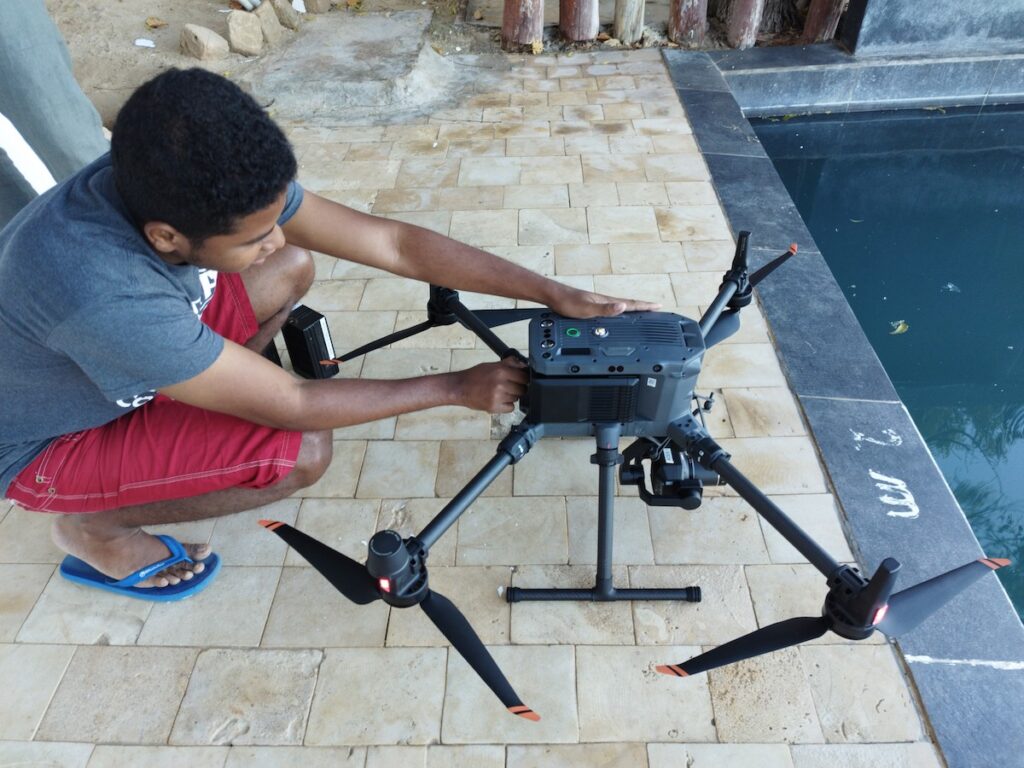The past months marked a significant milestone for the ARMS Restore project team, as we embarked on an exciting collaboration with Ved Chirayath, a former NASA scientist and current Professor at the University of Miami. Ved, renowned for his pioneering work in coral reef mapping, brought his expertise to Madagascar, using advanced drones and his fluid lensing technology for an unprecedented survey of the region’s coral reefs.
These high-precision drones are a game-changer in our efforts to preserve Madagascar’s delicate marine ecosystems. They provide extremely accurate mapping data, allowing us to monitor changes in the coral reefs year after year. This ongoing comparison is crucial for assessing the health and vitality of these ecosystems.
An integral part of the ARMS Restore project, coordinated by the Coral Reef Research, Education, and Conservation Team at the Marine and Coastal Environment Laboratory of the Fishery and Marine Science Institute, University of Toliara, Madagascar, is its commitment to community involvement. This project aims not only to study and conserve the coral reefs but also to empower local communities. By teaching and involving the community in the mapping process, we hope to ensure that local teams can independently conduct these surveys in the future.
Ved’s approach has already proven successful in Guam, where, with NASA’s support and Dr. Romina King, he trained 25 local pilots to operate these advanced drones. These pilots now independently monitor their coral reefs, setting a precedent for community-led conservation efforts.
Adding to his contributions, Ved shared his insights and experiences with students and researchers at the Institute of Fishery and Marine Science (IH.SM) through a seminar on October 31st. Titled “Revealing the Ocean Deep: Next-Generation Sensing Technologies for Marine and Planetary Science,” the seminar offered a deep dive into cutting-edge technologies for marine research. The event was a resounding success, sparking keen interest and engaging discussions among the participants. Questions posed by attendees highlighted the growing enthusiasm and curiosity about the project’s potential impacts on marine resource research and management.
We are thrilled to be part of this groundbreaking project with Ved and look forward to seeing its positive impact on ocean conservation in Madagascar and beyond. The ARMS Restore project, active in Madagascar, the USA (Harvard University), Sweden (Beijer Institute of Ecological Economics), France (IRD), and the UK (Reef Doctor), continues to lead the way in innovative marine conservation strategies.
In closing, we extend our heartfelt gratitude to the National Research Foundation (South Africa), and SIDA (Sweden) for their immense support and for expanding our project to include the mapping initiative. Their backing has been instrumental in facilitating the advancement of our work and underscores the collaborative spirit that drives impactful research and conservation efforts globally. With such support, we are more empowered than ever to continue our mission of preserving the coral reefs of Madagascar for future generations.

